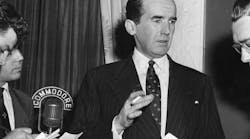Good Night and Good Luck
The sign-off “Good night and good luck” was the signature phrase which the broadcast journalist Edward R. Murrow used at the end of each episode of his show.
Murrow hosted interviews (and opined eloquently) about trends on a television show that was the first to utilize a pair of split screen interviewees, or what we now call “talking heads.”
In a few weeks it will be the 60th anniversary of an important speech Murrow made near the end of his career. On October 15, 1958 Murrow “blasted TV's emphasis on entertainment and commercialism at the expense of public interest.”[1]
It has been an honor to have been able to contribute to these Smart Utility pages during the last two years.
I am encouraged by this week’s announcement about the DOE’s Funding opportunity announcement (FOA) to support smart grid-related R&D. The DOE FOA is an initiative readers on either side of the political spectrum could both agree is a good thing. One would hope….
The DOE R&D funding is at the intersection point of artificial intelligence, machine learning, and better utilization of new sensors for real-time data on the grid. It is an area, like many other basic R&D areas, where government funding fills a vital need.
Government funding for such R&D takes up the slack in areas where optimal standards or market development are in need of enablement, and/or where profitability is still too far off in the future for corporate R&D investments to fully step in. Such R&D helps to ensure, in the long run, that robust new markets are created, which will serve our industry’s end-use customers better.
Given how our political discourse has become so over-charged with oppositional points of view, it would not be surprising if the DOE’s grid R&D initiative garners its share of dissenters, from either side of the political spectrum.
We spend so much time looking at talking heads, or reading issue coverage couched in oppositional terms, it is worthwhile to consider what drives this discourse. Why do so many editorials or articles have to have an enemy or a so-called “straw man” to debunk?
What comes to mind for you, if you were asked to think about our Secretary of Energy, who serves all of us as the head of the DOE? Or, speaking of talking heads, if you were asked to think about the musician David Byrne?
I mention these two men, unrelated though they may seem, because Byrne wrote a lyric about our civil servants that comes to mind here.
In 1977, as lead singer of the band Talking Heads, David Byrne wrote a song “Don’t Worry About the Government” that included the following lines:
“Some civil servants are just like my loved ones
They work so hard, and they try to be strong.”
The problem, of course, is that worry and conflict are quick and easy selling tools, given ways in which our emotions, moment to moment, tend to be better drivers of what we watch and read, than our intellects.
I hope, in the long run however, that our intellects and the better side of our emotional and tribal tendencies manage to win out, and to increase rather than decrease the quality of our discourse. And that we support good government R&D for our industry, and good engineering economic decisions for our infrastructure.
In the meantime, good night and good luck!
[1] See: “Edward R. Murrow and the Birth of Broadcast Journalism” by Bob Edwards. Also see the reference to Murrow’s speech on October 15, 1958, for the Radio and Television News Directors Association in Chicago in the entry in Wikipedia, “Edward R. Murrow”


